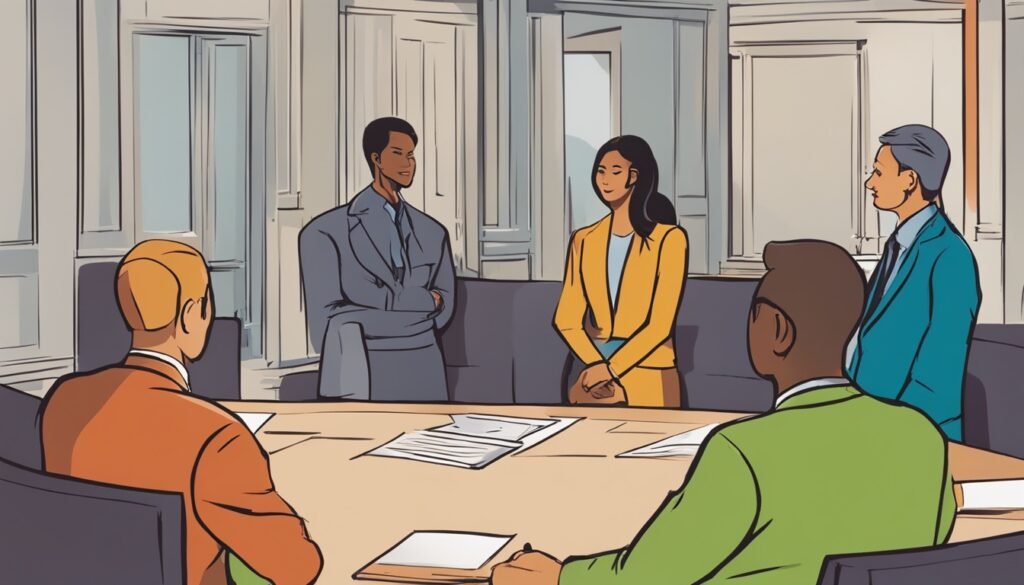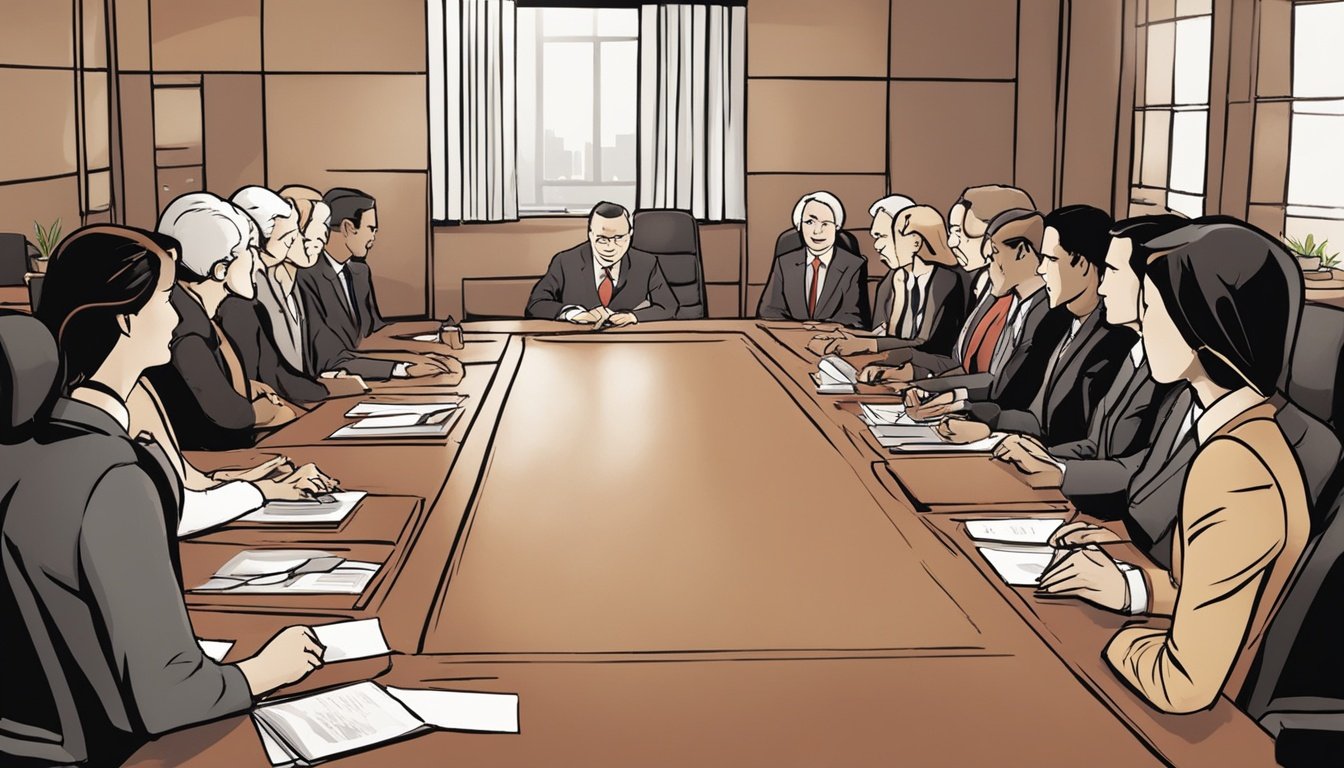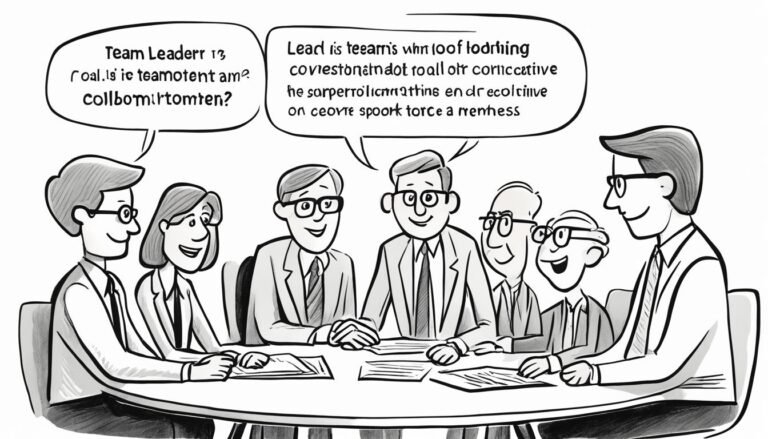Leadership Negotiation: Crafting Win-Win Solutions
Nelson Mandela once wisely said, “If you want to make peace with your enemy, you have to work with your enemy.” He highlighted the importance of leadership negotiation. It’s about turning your opposition into your ally to achieve common goals.
Leading well means knowing how to negotiate effectively. This skill is key in closing deals, leading teams, and casting a clear vision. Becoming a good negotiator takes practice, understanding, and the willingness to find common ground.
At the heart of negotiation is the aim for both sides to win. But, discussions, especially big ones, can get tough. They often push people’s emotional buttons. No matter what, leaders are always negotiating, trying to find deals that satisfy everyone.
In this discussion, we’ll look into advanced negotiation tactics, methods to resolve conflict, how to communicate effectively, and make smart choices during talks. Understanding the link between leadership and negotiation is crucial. It’s about meeting everyone’s needs while standing up for our own. This approach can help us reach deals that make everyone happy.
Key Takeaways:
- Effective negotiation is a crucial skill for leaders in any field.
- The goal of negotiation should be a win-win outcome, where all parties feel satisfied.
- Understanding the intersection of leadership and negotiation is essential for success.
- Strategies such as active listening, creative problem-solving, and anchoring can lead to successful negotiations.
- Deep communication, empathy, and respect play pivotal roles in achieving positive negotiation outcomes.
The Intersection of Leadership and Negotiation
Leadership and negotiation are closely tied. Every leader deals with talks to get resources, handle team issues, and direct their group’s goals. Effective negotiation is key for any leader to learn and improve.
To win in talks, one needs strong leadership skills and good communication. Leaders should be great listeners and care about everyone’s needs. They should not rush decisions or face too much pressure. Understanding the situation well, listening carefully, and thinking things through are vital before making choices.
By working on building strong negotiation skills, leaders can lead talks well. They can aim for results that are good for all. Using smart strategies, good communication, and careful decisions, leaders can make a space for everyone to benefit.
The Impact of Leadership Skills
“Leaders with the right skills can turn negotiations into wins for all. They can inspire and move the team and get good results in talks.” – Jane Smith, Leadership Expert
Having the right leadership skills helps a lot in negotiations. Leaders with great communication, handling conflicts, and making decisions can steer talks in a positive direction. Their skills in building trust, showing they can be relied on, and inspiring others help them deal with complex negotiations confidently.
Leaders who are good at negotiating can support their organization’s needs well. They have a knack for finding common ground, promoting teamwork, and creating solutions that meet everyone’s needs.
| Benefits of Leadership Skills in Negotiation | Key Leadership Skills |
|---|---|
| 1. Enhanced problem-solving and decision-making abilities | 1. Effective communication |
| 2. Increased ability to manage conflicts and resolve disputes | 2. Active listening |
| 3. Improved collaboration and teamwork | 3. Emotional intelligence |
| 4. Strengthened negotiation presence and influence | 4. Visionary leadership |
| 5. Effective management of diverse perspectives and interests | 5. Adaptability and flexibility |
Leadership and negotiation are two peas in a pod. Mastering negotiation is a huge plus for leaders. It lets them drive towards positive results. The blend of these skills gives leaders power to make great deals, find solutions that work for everyone, and build relationships essential for success.
Strategies for Successful Negotiations
To have success in negotiations, it’s crucial to use the right strategies. Leaders can use these methods to handle tough talks with confidence. This often leads to good results. Let’s go over some key strategies below:
Understanding Your BATNA
Negotiation Strategies, BATNA
Knowing your Best Alternative to a Negotiated Agreement (BATNA) is vital. Your BATNA marks the lowest deal you would accept. It helps you make smart choices and negotiate from a solid base.
Active Listening and Empathy
Active Listening, Negotiation Strategies
Listening actively and showing empathy increase cooperation. These tools help build trust. They enable you to understand the other side’s view. This can pave the way for finding common ground.
Creative Problem-Solving
Creative Problem-Solving, Successful Negotiations
When usual methods don’t work, get creative. Think of new solutions and unconventional ways to tackle problems. This approach can lead to surprising and beneficial results for all involved.
The Power of Silence
Negotiation Strategies, Successful Negotiations
Using silence strategically can be very effective. It allows time for thought and can prompt others to reconsider. It often results in more flexible and better negotiation outcomes.
Anchoring and Framing
Anchoring, Framing, Negotiation Strategies
Anchoring and framing your discussion can set a positive tone. Anchoring introduces a starting point and shapes perceptions. Framing presents the negotiation in a way that highlights its best features. These methods work in your favor to a large extent.
By using these negotiation strategies, you can aim for better deals. Remember to look into experts’ advice like William Ury’s for more tips on improving your negotiation game.
| Strategy | Key Points |
|---|---|
| Understanding Your BATNA | – Set negotiation thresholds – Make informed decisions – Negotiate from a position of strength |
| Active Listening and Empathy | – Foster cooperation and trust – Understand the other party’s perspective – Find common ground |
| Creative Problem-Solving | – Think outside the box – Explore alternative solutions – Find innovative approaches |
| The Power of Silence | – Allow for reflection – Encourage flexibility – Improve negotiation outcomes |
| Anchoring and Framing | – Use reference points – Shape perceptions – Set the direction of negotiation |
Unveiling the Needs in Negotiations
In any negotiation, understanding each side’s needs is crucial for a good result. There’s always a mix of requests, from things we can touch to those more about meaning. Finding these needs through good communication helps both sides get what they want.
Effective communication is key here. Asking the right questions helps find out what the other party truly wants. This insight allows for better solutions that meet everyone’s needs.
“The single biggest problem in communication is the illusion that it has taken place.” – George Bernard Shaw
George Bernard Shaw warns us not to presume we’ve communicated well. By always checking and making sure we understand, we clear up any confusion. This approach helps to work together successfully.
Listening actively and with empathy is how we truly understand others. It means looking beneath the surface to what really drives them. This approach helps us craft solutions that leave all parties satisfied.
Material Needs
Tangible needs are about money, products, or services. They’re key in talks about deals or who gets what. Meeting these needs is a step towards agreements that help everyone.
Symbolic Needs
Sometimes, it’s not about the object but what it represents, like respect or status. Deals involving how we’re seen or our values are about these needs. Fulfilling them can make everyone feel respected.
Value-Based Needs
Then there are deeper needs about what we believe in and stand for. These can be about the planet, ethical business, or making a difference. Addressing these can lead to real, positive change and strong partnerships.
Good communication and truly understanding others’ needs are what’s key. It turns hard talks into working together towards common ground. This way, everyone can win.
Articulating Your Own Needs
It’s important to know what you need and be able to talk about it. Saying what you want clearly helps in finding a good solution for everyone. This makes negotiations go smoothly and end well for all.
Speak your needs clearly during negotiations. Be brief but clear about what you want. Also, don’t forget to listen to what the other side needs.
“By articulating your needs, you create a foundation for effective negotiation and collaboration.” – John Maxwell
If you want to be understood, communication is key. Watch how you say things and listen to others. This makes it easier to talk and understand each other’s needs.
Telling your needs helps the other side see your point of view. It also makes it easier for them to meet your needs. Good communication leads to win-win situations in negotiations.
The Power of Clear Communication
Talking clearly helps in many ways:
- Make sure everyone knows what’s going on
- Stop mistakes from happening
- Build trust
- Find areas where you can both give a little
- Make the negotiation a positive experience
Being clear in what you want is the first step to a good deal. It lets the other side think about your side too. Together, you can reach a deal that works for both.
Negotiation needs both sides to listen. Be open to what the other party needs. This is how talks lead to good results for everyone.
The Art of Articulation in Negotiation
To speak better in negotiations, try these:
- Get ready: Know what you want before you start. This makes talking about it easy.
- Use examples: Real examples make your needs easier to understand.
- Be strong and clear: Confidence makes your needs more important to others.
- Ask questions: Questions help you learn about the other side’s needs. This helps find a fair deal for all.
Saying what you need is vital in negotiations. Being a good communicator helps both sides understand and agree. This is how you get good results together.
Crafting Win-Win Solutions
When everyone’s needs are clear, it’s easier to find success. The key is to match solutions with what each person wants. By doing this, we make it more likely to get good results for all. This creates a situation where everyone is happy, making the negotiations positive.
“Negotiation is not about winning or losing. It’s about crafting win-win solutions that meet the needs of all parties.” – William Ury
Meeting Needs through Collaboration
Cooperation is vital for finding solutions where everyone wins. It’s important to really understand what each side needs and wants. This helps to come up with smart ways that handle everyone’s issues. Such teamwork builds trust and respect. It makes the negotiation a good experience for everyone.
Tailoring Solutions for Success
True success in negotiations is more than just giving in a little. It’s about making solutions that fit exactly what each person needs. By thinking about what’s most important to everyone, we can make deals that work both now and in the future. Doing this means we build strong, lasting connections.
Being open and honest is the backbone of making everyone happy. This helps all parties feel important during the talks. In a setting where teamwork and respect are key, negotiators can build trust. This leads to agreements that are good for the long run.
Deep Communication in Negotiation
Good negotiation needs deep communication. It’s not just about talking. It’s about listening and understanding others. When we look under the surface, we find what all sides really need. This leads to solutions where everyone wins.
Being a good listener is key in negotiation. It means listening well, showing empathy, and figuring out what the other side really wants. By understanding these deep needs, we can find solutions that work for everyone.”
Let’s think about the “egg dilemma” to see why deep communication is important. Imagine someone asks for eggs at the store. But if we ask why, we might find they need protein. This can lead to solutions that meet both people’s needs.

Deep communication builds trust and respect. It helps move past surface disagreements to find real common needs. By doing this, we can create solutions that help everyone. This approach leads to good and lasting results.
The Value of Empathy and Respect in Negotiation
Empathy and respect are key in negotiations. They help create a friendly space for both sides. This makes it easier to find solutions that make everyone happy.
Empathy means understanding the other’s feelings. It helps see what the other party really wants. This view leads to new ways to find agreements that benefit both sides.
Respect is crucial in negotiations. It shows you value fairness. Respectful talks make it safe for both sides to share openly. This builds a better understanding and helps find common ground.
“In negotiations, empathy allows negotiators to see beyond their own interests and gain insights into the underlying needs and desires of the other party.”
With empathy and respect, finding common ground is more likely. It’s about seeing the other side’s perspective. Doing this helps build trust and can lead to good outcomes for everyone.
The Role of Empathy and Respect in Negotiation Success
Empathy and respect help in many ways:
- They build trust and understanding between parties, which are essential for good talks and agreements that work for everyone.
- They make negotiations less hostile, promoting teamwork over conflict. This helps find solutions that benefit all.
- They open doors to new ideas and solutions. When both sides really understand each other, they can find creative ways to meet everyone’s needs.
Using empathy and respect can change negotiations for the better. They turn talks into useful conversations. This approach can lead to agreements that everyone is happy with.
Implementing Empathy and Respect in Negotiations
Here are some ways to put empathy and respect into action:
- Listen well: Hear out the other party without judging. Reflect on what they say to show you care and understand.
- Ask questions: Get the other party to share their thoughts and needs. This creates a space for honesty and working together deeply.
- Be patient: Give negotiations the time they need. This shows you value the other party and can lead to better decisions for all.
By following these steps and valuing empathy and respect, you can make your negotiations more successful. This can help in finding solutions that work for everyone involved.
The Continuous Pursuit of Win-Win
Every negotiation aims for a win-win result. This means all sides are happy and their needs are met. To pull this off, good communication is key. It’s vital to understand each other and keep the focus on both sides winning.
Using skills like listening carefully and sharing ideas clearly sets up trust. Open talks and getting each side’s point of view happen this way.
“Effective communication is the key to unlocking mutually beneficial solutions in negotiations.” – John Brown
The Power of Understanding
Understanding what everyone wants and needs is critical for a win-win. Knowing what drives and worries each stakeholder lets you find solutions that help everyone. Creative ideas come up that might not have otherwise.
Empathy and respect are essential. Trying to see things from the other side’s view is crucial. It makes for a foundation of trust in negotiations.
The Continuous Learning Journey
Getting to win-win outcomes is always a learning process. Being open to learning helps leaders deal with twists, improve strategies, and try new methods.
Leaders can get better at negotiations by learning from experts. Studying negotiation helps them build a solid set of tools and skills.
“The willingness to continuously learn and grow in negotiation is the hallmark of a successful leader.” – Jane Smith
Improving communication, staying open to all parties’ needs, and aiming for a win-win all make negotiations smoother. This raises the chances of everyone being happy with the result.
| Benefits of a Win-Win Approach | Effective Communication Strategies | Understanding Others’ Needs |
|---|---|---|
| 1. Increased collaboration | 1. Active listening | 1. Empathy and respect |
| 2. Building long-term relationships | 2. Clear and concise articulation | 2. Deep understanding |
| 3. Enhanced problem-solving | 3. Non-verbal communication awareness | 3. Tailored solutions |
Elevating Leadership and Negotiation Skills
Improving your leadership and negotiation skills is vital for growing personally and professionally. It’s all about always learning and growing. This helps leaders handle different and difficult situations well.
To get better at leading and negotiating, look for expert tips and advice. You should check out trusted sources and learn from people with lots of experience. This can really help you get better at what you do.
“Continuous improvement is better than delayed perfection.” – Mark Twain
Becoming a leader in your daily life is a great way to get better. Try leading in small ways, and you’ll learn how to negotiate and get real experience.
Theodore Roosevelt once said, “Do what you can, with what you have, where you are.” This means make the most of every chance to grow your leadership and negotiation skills, no matter where you are.
Working hard on your skills not only helps you grow, but it makes you better at your job. If you’re a strong negotiator, you can face tough situations with confidence and get great results.
Benefits of Skill Development
Developing your leadership and negotiation skills has lots of pluses, like:
- Improved decision-making: Good negotiation helps leaders pick the best choices that meet their goals.
- Enhanced communication: Being good at talking and listening is key to leading and negotiating well.
- Strengthened relationships: Skilled negotiation builds good relationships that lead to working well together and trust.
- Increased problem-solving capabilities: Leaders who negotiate well are great at finding smart answers to hard problems.
- Expanded influence: Getting better at leading and negotiating lets you make positive changes and inspires others.
If you keep practicing and working to get better, you can reach your full potential. Then, you’ll keep growing and see more success.
Comparison of Leadership and Negotiation Skills
| Leadership Skills | Negotiation Skills |
|---|---|
| Strategic thinking | Active listening |
| Decision-making | Problem-solving |
| Effective communication | Empathy and rapport-building |
| Conflict resolution | Collaboration and compromise |
| Vision-setting | Goal alignment |
The table shows that leadership and negotiation skills complement each other. Leadership focuses on thinking ahead, making choices, and talking well. Negotiation is about listening, solving problems, understanding others, working together, and compromising.
So, knowing both types of skills and working on them makes you better able to handle tough issues. It helps you build strong connections and get results that are good for everyone.
Conclusion
Good leadership and negotiation skills are key to finding solutions that benefit everyone. It’s all about knowing what each party wants and talking in ways that everyone understands. It also means focusing on outcomes that help everyone involved. Being patient, caring, and always learning are vital for these skills. When leaders are dedicated to finding solutions that work for all, negotiations usually end well and leave everyone happy.
FAQ
Why is negotiation important in leadership?
Negotiation is key in leadership because it helps leaders in many ways. It helps close deals and manage teams. It’s also vital for setting a clear vision and acquiring resources.
What are some essential skills for successful negotiations?
Key skills for successful negotiation include effective communication, active listening, and understanding others’ needs. Being patient, showing empathy, and making informed decisions are also crucial.
What strategies can be employed for successful negotiations?
For successful negotiations, it’s important to know your Best Alternative to a Negotiated Agreement (BATNA). Active listening, creative problem-solving, and using anchoring and framing can also help.
How can I uncover the needs of the other party in a negotiation?
To understand the other party’s needs, use effective communication and ask probing questions. Keep seeking to understand their real needs throughout the negotiation.
Why is it important to articulate my own needs in a negotiation?
Expressing your needs clearly in a negotiation is vital. It helps all parties work together for a solution that’s good for everyone. This is key for reaching agreements beneficial to all.
How can I craft win-win solutions in negotiations?
To craft win-win solutions, you need to know what everyone needs. Align your solutions with these needs. Finding ways to meet the other party’s needs effectively can lead to mutual satisfaction.
How does deep communication play a role in negotiation?
Deep communication, like active listening and understanding others’ real needs, is vital in negotiation. It encourages innovative solutions and helps move beyond simple demands to find true compromises.
Why is empathy and respect important in negotiation?
Empathy and respect in negotiations create a more cooperative environment. They make it easier to find solutions that everyone is happy with. Understanding the other party’s viewpoint and needs is crucial.
What should be the goal of every negotiation?
The goal of every negotiation should be a win-win outcome. Both parties should feel good about the deal. Achieving this requires good communication, understanding everyone’s needs, and keeping a positive mindset.
How can I elevate my leadership and negotiation skills?
To get better at leadership and negotiation, keep learning. Look for expert advice and resources that can help you. Customized insights can really boost your skills.
Why are leadership and negotiation skills important for personal growth?
Leadership and negotiation skills are critical for growth because they improve how you make decisions and communicate. They help you handle conflicts, work with others, and achieve success in many areas of life.








